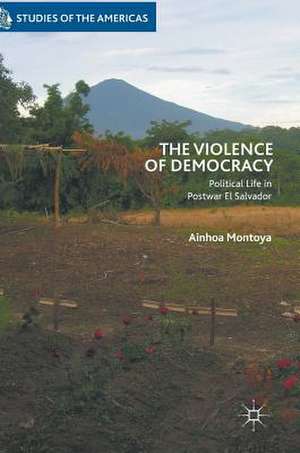The Violence of Democracy: Political Life in Postwar El Salvador: Studies of the Americas
Autor Ainhoa Montoyaen Limba Engleză Hardback – 28 mai 2018
| Toate formatele și edițiile | Preț | Express |
|---|---|---|
| Paperback (1) | 181.37 lei 22-36 zile | |
| Springer International Publishing – 19 dec 2018 | 181.37 lei 22-36 zile | |
| Hardback (1) | 649.54 lei 43-57 zile | |
| Springer International Publishing – 28 mai 2018 | 649.54 lei 43-57 zile |
Din seria Studies of the Americas
- 15%
 Preț: 708.83 lei
Preț: 708.83 lei - 20%
 Preț: 566.73 lei
Preț: 566.73 lei -
 Preț: 357.58 lei
Preț: 357.58 lei -
 Preț: 300.85 lei
Preț: 300.85 lei -
 Preț: 303.28 lei
Preț: 303.28 lei -
 Preț: 305.50 lei
Preț: 305.50 lei -
 Preț: 308.36 lei
Preț: 308.36 lei -
 Preț: 312.10 lei
Preț: 312.10 lei -
 Preț: 298.66 lei
Preț: 298.66 lei -
 Preț: 389.70 lei
Preț: 389.70 lei -
 Preț: 394.12 lei
Preț: 394.12 lei -
 Preț: 388.72 lei
Preț: 388.72 lei -
 Preț: 388.72 lei
Preț: 388.72 lei -
 Preț: 388.72 lei
Preț: 388.72 lei -
 Preț: 389.31 lei
Preț: 389.31 lei -
 Preț: 389.70 lei
Preț: 389.70 lei - 15%
 Preț: 697.65 lei
Preț: 697.65 lei -
 Preț: 392.60 lei
Preț: 392.60 lei -
 Preț: 384.31 lei
Preț: 384.31 lei - 18%
 Preț: 736.81 lei
Preț: 736.81 lei -
 Preț: 390.25 lei
Preț: 390.25 lei -
 Preț: 394.51 lei
Preț: 394.51 lei - 18%
 Preț: 782.52 lei
Preț: 782.52 lei -
 Preț: 393.74 lei
Preț: 393.74 lei -
 Preț: 388.72 lei
Preț: 388.72 lei -
 Preț: 391.61 lei
Preț: 391.61 lei -
 Preț: 382.57 lei
Preț: 382.57 lei -
 Preț: 391.40 lei
Preț: 391.40 lei -
 Preț: 390.08 lei
Preț: 390.08 lei -
 Preț: 388.72 lei
Preț: 388.72 lei - 15%
 Preț: 642.36 lei
Preț: 642.36 lei -
 Preț: 392.75 lei
Preț: 392.75 lei - 15%
 Preț: 503.37 lei
Preț: 503.37 lei -
 Preț: 392.37 lei
Preț: 392.37 lei - 15%
 Preț: 638.43 lei
Preț: 638.43 lei -
 Preț: 388.72 lei
Preț: 388.72 lei -
 Preț: 383.71 lei
Preț: 383.71 lei - 15%
 Preț: 635.65 lei
Preț: 635.65 lei -
 Preț: 388.52 lei
Preț: 388.52 lei -
 Preț: 386.81 lei
Preț: 386.81 lei -
 Preț: 387.75 lei
Preț: 387.75 lei -
 Preț: 392.60 lei
Preț: 392.60 lei -
 Preț: 388.72 lei
Preț: 388.72 lei -
 Preț: 388.72 lei
Preț: 388.72 lei
Preț: 649.54 lei
Preț vechi: 764.17 lei
-15% Nou
Puncte Express: 974
Preț estimativ în valută:
124.33€ • 135.09$ • 104.50£
124.33€ • 135.09$ • 104.50£
Carte tipărită la comandă
Livrare economică 21 aprilie-05 mai
Preluare comenzi: 021 569.72.76
Specificații
ISBN-13: 9783319763293
ISBN-10: 3319763296
Pagini: 331
Ilustrații: XVII, 303 p. 2 illus., 1 illus. in color.
Dimensiuni: 148 x 210 mm
Greutate: 0.67 kg
Ediția:1st ed. 2018
Editura: Springer International Publishing
Colecția Palgrave Macmillan
Seria Studies of the Americas
Locul publicării:Cham, Switzerland
ISBN-10: 3319763296
Pagini: 331
Ilustrații: XVII, 303 p. 2 illus., 1 illus. in color.
Dimensiuni: 148 x 210 mm
Greutate: 0.67 kg
Ediția:1st ed. 2018
Editura: Springer International Publishing
Colecția Palgrave Macmillan
Seria Studies of the Americas
Locul publicării:Cham, Switzerland
Cuprins
1. Introduction .- 2. The Fallacy of the Telos of Transition .- 3. The Postwar Gray Zone of Politics .- 4. Neoliberalization and the Violence Within .- 5. War Reenactment through Elections .- 6. Memory Work in the Aftermath of War .- 7. The 2009 Shift .- 8. Conclusion.- 9. Epilogue.
Notă biografică
Ainhoa Montoya is Lecturer in Latin American Studies and ESRC Future Research Leaders Fellow at the School of Advanced Study, University of London, UK.
Textul de pe ultima copertă
This book offers novel insights about the ability of a democracy to accommodate violence. In El Salvador, the end of war has brought about a violent peace, one in which various forms of violence have become incorporated into Salvadorans’ imaginaries and enactments of democracy. Based on ethnographic research, The Violence of Democracy argues that war legacies and the country’s neoliberalization have enabled an intricate entanglement of violence and political life in postwar El Salvador. This volume explores various manifestations of this entanglement: the clandestine connections between violent entrepreneurs and political actors; the blurring of the licit and illicit through the consolidation of economies of violence; and the reenactment of latent wartime conflicts and political cleavages during postwar electoral seasons. The author also discusses the potential for grassroots memory work and a political party shift to foster hopeful visions of the future and, ultimately, to transform the country’s violent democracy.
Ainhoa Montoya is Lecturer in Latin American Studies and ESRC Future Research Leaders Fellow at the School of Advanced Study, University of London, UK.
Caracteristici
Demonstrates anthropology’s ability to contribute to the study of democracy-making and explores how the notion of democracy can be imbued with diverse meanings Ethnographically examines citizens’ practices and political subjectivities in the context of a post-war, liberal market democracy Sheds light on the complexity of endemic violence in El Salvador and the relationship of this violence to the country’s gray domains of politics
